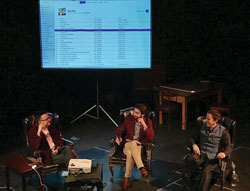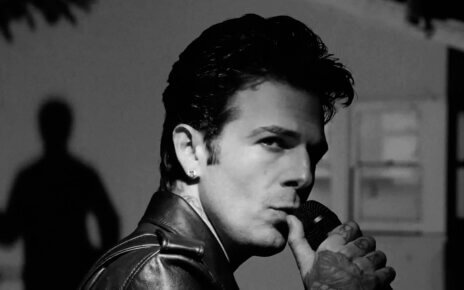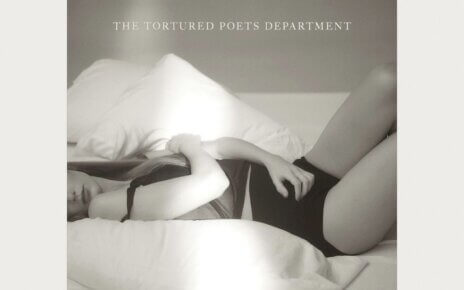“If you don’t like something on this album, chances are you don’t like music,” said an audience member at the Feb. 7 Record Club review of Blondie’s Parallel Lines.
If you were to have wondered into Lauren K. Woods Theatre on Tuesday, Feb. 7 at 7:30 p.m., you would have found about 30 people gathered to discuss music. Monmouth’s Record Club invited the community to meet and discuss Blondie’s hit album, Parallel Lines. There were three panelists that lead the discussion that Tuesday night: Kenneth Womack, Ph.D., and Dean of the School of Humanities And Social Sciences; Michael Thomas, M.F.A., and Associate Dean of the School of Humanities and Social Sciences; and Nick Messina, Communication Instructor.
Blondie formed in 1974, but went rather unnoticed in the United States until Parallel Lines was released in 1978, according to Messina, who noted that this album was one of the most overlooked albums of the 70s.
In describing the vibes of the band’s music, Messina said, “Blondie has punk roots, but it’s light and melodic as well. There are some pop hooks in here, and that’s something Debbie (Debbie Harry, Blondie’s lead singer) brought into the equation.”
The first song discussed of the night was “Hanging on the Telephone.” This song showed what Blondie was producing at the beginning of its career. The panelists showed the music video for this song, which seemed strikingly 70s-esque to me. There was a black and white striped wall behind the band, Debbie Harry had bleach-blonde hair, and the guys behind her had hairstyles that resembled The Beatles’ haircuts.
“‘Hanging on the Telephone,’ which is a cover, has a great lyrical hook. It’ll get stuck in your head,” added Furgason.
After getting a look at Blondie’s beginnings, we moved on to song number two, which many people who don’t even know Blondie’s music are familiar with: “One Way or Another.” This was a song I’d heard before, but never really thought in depth about until this meeting. One thing that I found to be interesting about the discussion of this song was the actual meaning behind it.
Messina informed the audience that Harry had been stalked prior to recording this song. “She made this as an empowerment for women,” he said. Messina also added that Debbie was one of the few well-known females in punk at this time, and she really “rose to the occasion” here. Harry performed this as a way to recognize her past and show her power; she wanted to show dominance and create an intimidating song just as men did then.
“This is a record where a woman is observing a man in a lustful and sexual way,” said an audience member during the discussion. “It’s fascinating in that regard. It didn’t happen back then.”
The third song of the night was “Once I Had a Love (a.k.a. the Disco Song).” The panelists showed this video as well, which was released later in the band’s career, so there was a different look. It seemed to be more 80s-esque; the picture was clearer and the general look of the band members had shifted. I also found it interesting that this music video was very straight forward when compared to videos today. The video was simply Harry singing and the band playing music. It was not extravagant or outrageous like many are today; it was simple and straightforward. The focus was truly on the music and not as much the looks, which I liked.
Another interesting comment made by an audience member after this video was that Harry looked much more like Marilyn Monroe in this video physically. It was then that Messina added the background note that Harry was influenced by Monroe, and as an adopted child, Harry tried to convince people that Monroe was her mother. She seemed to have modeled her sexuality and power after the beautiful yet strong Monroe.
Norene Heffner, an audience member at the event, said that when she thinks of this song and Harry, she thinks of freedom. “At this time, women were restricted on what jobs they could have and what they could do. At night, they could listen to disco or punk and it was freeing.”
The fourth song of the night was “Heart of Glass,” which was discussed briefly. This song had a much stronger piano and drum presence in the introduction, which was different from all of the other songs played that night.
The night ended with a flash-forward to one popular song on Blondie’s album released in 1980, American Gigolo, entitled “Call Me.” This song is just another example of Blondie’s sexual and expressive songs as a woman at this time, including the title of the album itself. In the song, it says, “Call me, on the line, call me call me any, any time…you can call me any day or night, call me.” This is Blondie showing that women can call on suitors just as men could.
“In 1978, Blondie had to earn the way to get into the studio,” said Womack. “Now, you and I could make an album.” This just goes to show that Blondie was talented, and technology has played a large role in music production today. Voices and sounds can be automated, when in the 1970s, it was not nearly as easy.
At the end, the panelist asked the students in the audience if Harry reminded them of any artists today, and freshman nursing student Brianne Orzepowski said yes, Lady Gaga. “Lady Gaga is rebellious, just like Debbie Harry is here.”
One thing that was unique about this Record Club meeting was the inclusion of some technology in the audience. When guests entered the room, they were given a sheet of paper with a Q-code on it. This allowed people to scan the code and vote on whichever album they’d like to have discussed at future meetings. This seemed like a good idea because now the audience can have a say in the music that they care about. The next meeting will be at 7:30 p.m. on March 21 to review The Beatles’ Sgt. Pepper’s Lonely Hearts Club Band in Woods Theatre.
Photo courtesy of Allison Perrine




